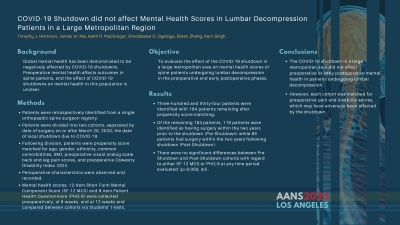COVID-19 Shutdown did not affect Mental Health Scores in Lumbar Decompression Patients in a Large Metropolitan Region
COVID-19 Shutdown Did Not Affect Mental Health Scores in Lumbar Decompression Patients in a Large Metropolitan Region
Friday, April 21, 2023


James W. Nie, BS (he/him/his)
Medical Student
University of Illinois College of Medicine
Chicago, Illinois, United States
ePoster Presenter(s)
Introduction: Global mental health has been demonstrated to be negatively affected by COVID-19 shutdowns. Preoperative mental health affects outcomes in spine patients, and the effect of COVID-19 shutdowns on mental health in this population is unclear.
Methods: Patients were retrospectively identified from a single orthopaedic spine surgeon registry. Patients were divided into two cohorts, separated by date of surgery on or after March 20, 2020, the date of local shutdown due to COVID-19. Following division, patients were propensity score matched for age, gender, ethnicity, common comorbidities, BMI, preoperative visual analog scale back and leg pain scores, and preoperative Oswestry Disability Index (ODI). Perioperative characteristics were observed and recorded. Mental health scores, 12-item Short Form Mental Component Score (SF-12 MCS) and 9-item Patient Health Questionnaire (PHQ-9) were collected preoperatively, at 6-weeks, and at 12-weeks and compared between cohorts via Students’ t-tests.
Results: Three-hundred and thirty-four patients were identified with 184 patients remaining after propensity score matching. Of the remaining 184 patients, 119 patients were identified as having surgery within the two years prior to the shutdown (Pre-Shutdown) while 65 patients had surgery within the two years following shutdown (Post-Shutdown). There were no significant differences between Pre-Shutdown and Post-Shutdown cohorts with regard to either SF-12 MCS or PHQ-9 at any time period evaluated (p>0.050, all).
Conclusion : The COVID-19 shutdown in a large metropolitan area did not affect preoperative or early postoperative mental health in patients undergoing lumbar decompression. However, each cohort was matched for preoperative pain and disability scores, which may have adversely been affected by the shutdown.
Methods: Patients were retrospectively identified from a single orthopaedic spine surgeon registry. Patients were divided into two cohorts, separated by date of surgery on or after March 20, 2020, the date of local shutdown due to COVID-19. Following division, patients were propensity score matched for age, gender, ethnicity, common comorbidities, BMI, preoperative visual analog scale back and leg pain scores, and preoperative Oswestry Disability Index (ODI). Perioperative characteristics were observed and recorded. Mental health scores, 12-item Short Form Mental Component Score (SF-12 MCS) and 9-item Patient Health Questionnaire (PHQ-9) were collected preoperatively, at 6-weeks, and at 12-weeks and compared between cohorts via Students’ t-tests.
Results: Three-hundred and thirty-four patients were identified with 184 patients remaining after propensity score matching. Of the remaining 184 patients, 119 patients were identified as having surgery within the two years prior to the shutdown (Pre-Shutdown) while 65 patients had surgery within the two years following shutdown (Post-Shutdown). There were no significant differences between Pre-Shutdown and Post-Shutdown cohorts with regard to either SF-12 MCS or PHQ-9 at any time period evaluated (p>0.050, all).
Conclusion : The COVID-19 shutdown in a large metropolitan area did not affect preoperative or early postoperative mental health in patients undergoing lumbar decompression. However, each cohort was matched for preoperative pain and disability scores, which may have adversely been affected by the shutdown.
